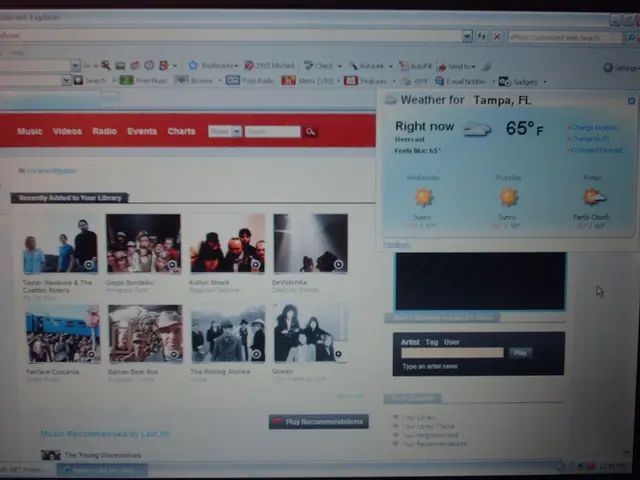Chrome Suffers Zero-Day Assault by TaxOff, Infiltrating Devices with Trinper Backdoor
In a recent turn of events, cybersecurity experts are urging Google Chrome users to update their browsers immediately to protect against a zero-day vulnerability exploited by an unidentified attacker known as TaxOff. This vulnerability, identified as CVE-2025-2783, was found within Google Chrome's V8 JavaScript engine.
Emma Lang, a renowned cybersecurity analyst, emphasizes the need for stronger collaboration between software developers and security professionals to combat the exploitation of such zero-day vulnerabilities. She states that a relentless pursuit of a secure digital environment necessitates shared vigilance, proactive engagement, and decisive actions towards threats as they emerge.
To secure Google Chrome against the CVE-2025-2783 vulnerability, the primary recommended step is to update Google Chrome to the latest patched version as soon as possible. This vulnerability was identified and patched by Google within weeks after initial exploitation, making ensuring Chrome is fully up to date crucial.
Specific steps include checking your Chrome version, enabling auto-update settings, especially for environments managing multiple devices, and staying alert for any new updates from Google related to zero-day fixes or further mitigations.
While CVE-2025-2783 is specifically noted for phishing attack exploitation, other recent zero-days like CVE-2025-6558 require similar urgent update actions.
In addition to updating, general best practices include using security settings in Chrome to restrict plugins and sites that can execute scripts, avoiding clicking suspicious links or opening unexpected attachments, and considering enterprise patch management solutions to automate vulnerability remediation.
The TaxOff incident serves as a wake-up call to the cybersecurity community and end-users, highlighting the precarious balance between innovative technology use and the protection of digital privacy. The attack underscores critical security flaws in widely used applications, such as Google Chrome.
Moreover, the incident compels security experts and organizations to reassess existing defense strategies and prioritize regular system updates and comprehensive threat assessments. The sophistication of TaxOff's attack underscores the ever-evolving and sophisticated nature of cyber threats.
In an increasingly connected world, addressing vulnerabilities promptly is not optional - it's imperative. The attack not only endangers personal user data but also opens pathways for larger network intrusions, posing significant risks to organizations and institutions. The seamless execution of this attack illustrates the necessity for ongoing scrutiny and enhancement of web browsers serving as gateways to internet resources.
Google has rolled out a critical security patch to close the exploited loophole in Chrome, urging users to update their browsers immediately. The company has also issued an urgent security update to mitigate the threat posed by this vulnerability.
In summary, to protect against the CVE-2025-2783 vulnerability exploited by TaxOff, users should immediately upgrade to the latest Chrome release, verify auto-updates are enabled, and maintain vigilance for phishing and suspicious content. Collective resilience remains paramount to safeguard our digital domain.
Emma Lang, acknowledging the urgency of the CVE-2025-2783 vulnerability, stresses that the collaboration between software developers and cybersecurity professionals is crucial for ensuring a secure digital environment. In response, encyclopedias of cybersecurity best practices should emphasize the importance of updates, including prompt upgrades to the latest version of Google Chrome, to counteract such zero-day threats. Moreover, these resources could highlight the necessity of technology advancements in cybersecurity measures to stay abreast of evolving threats, fostering a proactive approach to maintaining cybersecurity in finance and other sectors.








